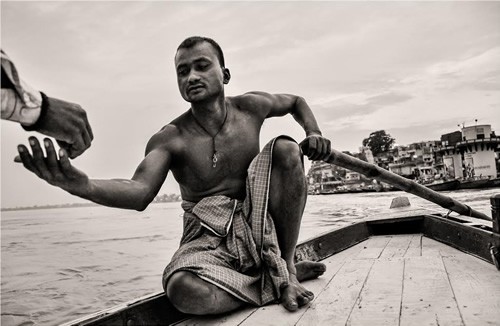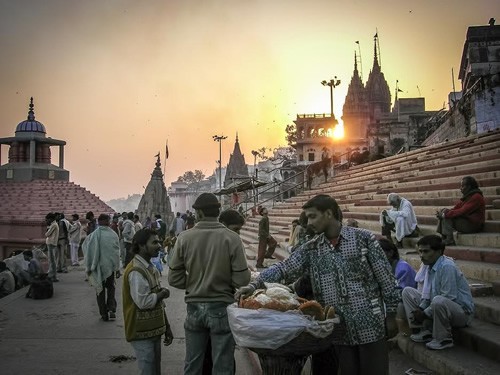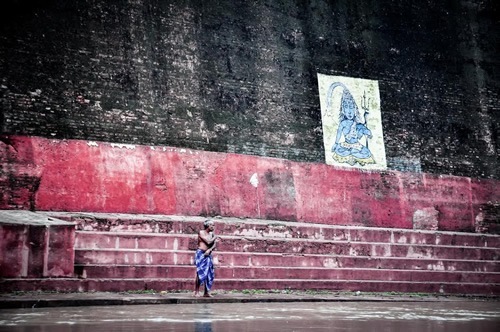India, Living and Dying
Article and photos by Matthew
Crompton (©) 2007-2015

|
|
A boatman at dawn on the Ganges
River.
|
November 2007
The first day, it was lying on its side, in the slight depression in the sand its body made. It was bloated, with a weird mortal pathetic snarl and its piebald skin all wet as the water would shush up around it and then wash back. A family was bathing in the sea, maybe ten meters away, either oblivious to the dead dog slowly rotting on the beach or unconcerned by it.
The fishermen gather and mend their nets everywhere around them before setting out for the day. They laugh and talk beside the colorful little boats that cluster on the shore, totally uninterested in the body of the dog lying there mere feet away from them, and sadly bloating.
Something about this business of the dog is fascinating — something about how naturally it is regarded, lying there rotting comfortably on a tourist beach with nobody batting an eye. Each day as it lies there, people splash in the surf nearby—children laughing, families on holiday—and yet still the dog remains, looking so sad with its muzzle pushed into the sand and its empty eyes.
Everywhere around the fishermen are
gathering and mending their nets before they set out for
the day, laughing and talking beside the colorful little
boats that cluster on the shore, totally uninterested in
the body of the dog which is lying there mere feet away
from them, and sadly bloating.
Something about this business of the
dog is fascinating. Something about how naturally it is
regarded, lying there rotting comfortably on a tourist beach
and nobody batting an eye. Each day as it lies there people
splash in the surf nearby — children laughing, families
on holiday — and yet still the dog remains, looking so sad
with its muzzle pushed into the sand and its empty eyes.
It seems strange and vivid to my American sensibilities, which scream that death must be kept apart and sterilized, not left here to contaminate the living with its bleak reminders. But here on the shore in this tiny town in Tamil Nadu, the dog lies undisturbed. Nobody denies it, and no one has asked that it be removed from view. And if the dog is a stark reminder of the reality of death, it is a reminder that has been stripped of its capacity to startle.
As I travel for the following weeks, the calendar giving way to Thanksgiving and rolling onward toward Christmas, I talk to people. On the trains, on buses, in the queues of temples, I open myself, talking the aimless, earnest, and constant talk of a confused 26-year-old seeker to all and sundry who will lend their ears and minds to hear. I speak to them about the dog, the death, and obliquely of the fear of dying it sparks in me. I speak of the religions of this place, the strange sense of living myth and legend, the feeling that awakening here in this place is possible, even as I live and breathe, and even as my living comes implicit with its own defeated end.
I am reminded on the train from Jalgaon, crossing the long, lonely Indian night through the interior of Madhya Pradesh, by a man cradling his daughter on his lap as she sleeps, that the most famous of the myths, the one the westerners have lionized, originated in the northern city to which I am headed, as a flight from the ever-present reality of death.
The legend, of course, is well known: a prince outside his palace cloister in what is now southern Nepal happens upon an older man, a sick man, and a dead man, and afflicted by these revelations of mortality, sets out across the eastern Indo-Gangetic plain, through the wilderness and patchwork city-states of ancient India. For years, the historical Buddha has wandered and practiced austerities, seeking liberation from the human body's sickness, suffering, and death. While it’s well known that his travels eventually led him to Sarnath, where he preached his first sermon on Buddhist law, it is the place of Sarnath that usually escapes notice.
Just miles from one of the oldest continually inhabited places in the world, Sarnath was — and still is — little more than a morning’s walk from the tourist center known today as the city of Varanasi. In the Buddha’s day, the location was known as the eponymous capital of the Kingdom of Kashi. So when the Buddha opened his mouth to preach the first words of Buddhist dharma, it did not happen in isolation, static as a museum frieze, but a mere stone’s throw from what was already one of the most important religious centers of the ancient world.
The part about the Buddha legend people miss: people came to Kashi to die. For Hindus, Kashi — the city of the great god Shiva — was synonymous with liberation, and dying within its precincts conferred upon them absolute moksha — a final release from the cycles of birth and suffering, dying, and disease. The fortunate dead of the holy city were burned there on the west bank of the Ganges in the final Hindu rites, consumed by flames said to have already been burning there for a thousand years. The riverbanks were the heart of a thriving city with a great economy of death, a place permeated and enriched by mortality.

|
|
Sunset on the ghats in
Varanasi.
|
Hinduism, though, mediated its liberation
through a vast priestly caste, the Brahmins, and all such
priestly classes exact their price. Poor and surrounded
by the immense mortality of the city of Kashi, it is easy
to imagine how compelling the Buddha’s egalitarian gospel
of bodily liberation must have been received by people living
in that time and place in the world — their death so
plain all around them.
When I arrive in Varanasi on a late December day more than 2,000 years later, there are scales at the Ganges riverside near where I rent a squalid room that still measures out the weight of wood to fuel the cremations, with every last bite of flesh paid for precisely. I stand there alone on the ghats on Christmas morning. The heat of the cremation fires like a hot flush on my face as my eyes sting with the smoke drifting up from the funeral pyres just below me.

|
|
Man washing himself along the
river Ganges in Varanasi.
|
As I stand, I can so easily imagine
a figure — the Buddha — cut out of the indistinct shapes
the mind makes of legend, watching as I do this raw red
foot tumble out of the fire, charred bone at its edges,
to be tipped by outcastes back into the flames, watching
the skin peel from the charred and mottled skull; watching,
as I do, without romance and without mystery, what becomes
of what is human.
Perhaps there is another lesson to be found here, though, in this impermanence without romance, in the candidness of human perishing. Here on the banks of the same gray Ganges, the ash from the burning dead settles on my jacket and the Brahmins' bare brown shoulders and shorn heads. Ash settles in the hair of the indifferent boys talking on mobile phones, drifts over the kettles and the tiny earthenware cups of the chai vendors, and up into the air above the city. The air is alive already this day with a hundred paper kites, their orange and red and blue paper rustling as they dive and swoop and dip above the boxy rooftops.
Below, in the narrow streets, the dead are borne on bamboo litters in shrouds of gold and white fabric and draped in garlands of marigolds. The processions with the dead pass by, and the living move aside. When the dead have passed, the living goes on living — buying fruit or cigarettes, pursuing tourists, and doing the wash.
And no one, I realize again, looking around me, no one is looking to escape or deny death here because death in this place is never far away. On the ghats, with the smell of burning filling my head, I close my eyes and feel the sense of life swelling within me to unbearable fullness.
Within the fullness rests a simple truth, the kind you fight to avoid before realizing the peace it brings: That my life will end wholly incomplete. And yet that that ending, that incompleteness, makes the whole cycle, the dismal and luminous spiral of events unified by my birth and death, a thing as rare and precious and ephemeral as a dewdrop in a desert.
In the middle of that imperfect and
temporal temporary life, lived like all others in a war
between futility and beauty, I open my eyes and through
the tears see the heat-lines from the funeral fires make
distorted shapes of the boats floating on the slack gray
water of the Ganga.
There is only so much time.
Winner of the seventh annual Solas
Awards for Best Travel Writing, Matthew Crompton is a writer, photographer, and occasional metaphysician now residing in Sydney after living previous lives in Seoul, San Francisco, and Cleveland. His travels have taken him through all the worst hotels on five continents, putting him on a first-name basis with all manner of mosquito-borne illnesses and intestinal parasites. His writing and photographs have been extensively published in the US, UK, Australia, and throughout Asia. His stories, "Into the Hills" and "Camel College," have appeared in "The Best Travel Writing" print anthologies.
|
